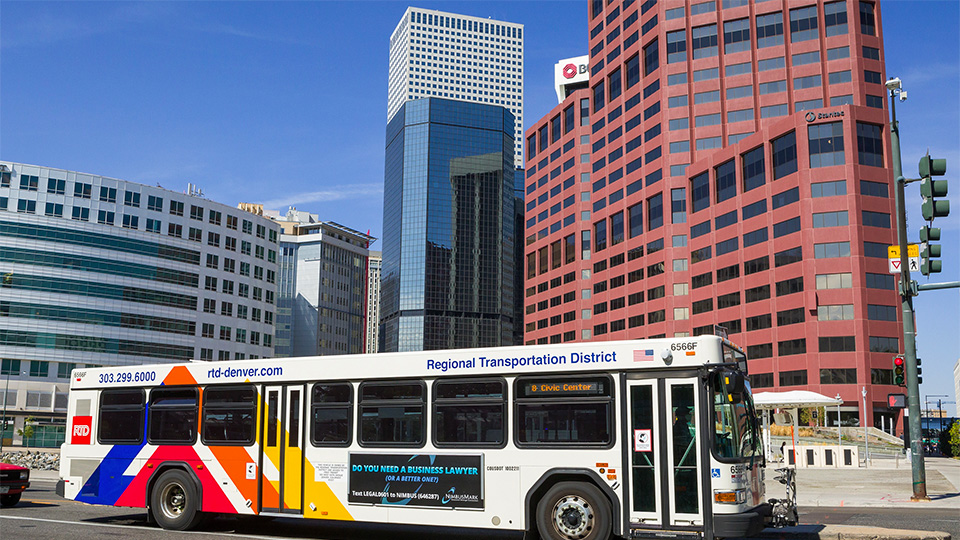
Tell your legislators: Increase funding for buses and trains
On October 20, 2023 the Colorado Air Quality Control Commission adopted the Clean Cars rule, expanding electric vehicle options over the next decade.
Send a message
On October 20, 2023, the Colorado Air Quality Control Commission adopted the Colorado Clean Cars rule.
Colorado Clean Cars, also referred to as “Advanced Clean Cars 2” or “ACC2” is a regulation that directs vehicle manufacturers to make and sell more electric vehicles (zero-emission vehicles including battery-electric, plug-in hybrid electric, and fuel cell electric vehicles) starting with model year 2027. By model year 2032, it directs auto manufacturers to sell approximately 82% electric vehicles. It also requires new conventional cars and passenger trucks to be more efficient and produce less air pollution.
The rule applies to new car, pickup truck, and SUV sales, but will not impact used car sales, or off-road vehicles or equipment.
The percentage of zero-emission vehicles (ZEVs) and plug-in hybrid electric vehicles (PHEVs) are scheduled to increase at the following rates. The following table shows the rates of ZEVs and PHEVs as a percentage of new vehicle sales through 2032, as adopted by Colorado:
| Year | ZEV and PHEV % of new vehicle sales |
| 2027 | 43% |
| 2028 | 51% |
| 2029 | 59% |
| 2030 | 68% |
| 2031 | 76% |
| 2032 | 82% |
Colorado is the only state following California that has opted for a partial version of the rule, adopting it through 2032 instead of the “full rule” which extends through 2035, resulting in 100% electric vehicles as new vehicle sales. The following table shows the impact of the rule if it was adopted through 2035:
| Year | ZEV and PHEV % of new vehicle sales |
| 2033 | 88% |
| 2034 | 94% |
| 2035 | 100% |
According to new data released by the Colorado Automobile Dealers Association, 17% of new vehicle sales were electric in the most recent quarter (the third quarter of 2023) – an increase from 13% at the beginning of the year. This new data places Colorado fifth in the country for total percentage of EV sales.
The vote makes Colorado the eighth state and first in the rocky mountain region to adopt California’s regulation, joining New York, Massachusetts, Vermont, Maryland, Delaware, Washington and Oregon. Colorado has an ambitious goal of getting 904,000 EVs on the road by 2030 and ramping up to nearly 100% EVs by 2050. This rule will help Colorado achieve this vision by making more EVs available to consumers, with benefits of reducing costs and improving air quality.
Air quality: With air quality in many parts of Colorado classified as in “severe” nonattainment of federal standards (meaning ozone levels continue to fall above the 2008 EPA standard of 75 parts per billion), transitioning the state’s light-duty vehicles to electric is a key strategy in reducing emissions and improving air quality.
Consumer costs: While the cost of recharging an EV can vary from state to state, a 2023 analysis by the Energy Policy Institute found that it’s cheaper to charge an EV than fill up on gas in every state, and especially in states where electricity rates are low and gas prices are high. The study found that on average, Colorado residents saved $28 per fill up in a sedan and $36 per fill up in an SUV, ranking the state 11th nationally by the Washington Post for overall consumer savings per fill up.
For the average American who drives 14,000 miles per year, that translates to savings of about $700 per year in fuel, with additional savings through lower maintenance.
Colorado consumers will benefit directly by saving money over time on lower fuel and maintenance costs associated with EVs. The rule also requires certain quality controls within EVS, such as a longer level 2 charging cord, minimum mileage requirements and battery durability standards. These quality control measures ensure EVs that go to states with Clean Cars rule will have all these features and therefore are better products for consumers. Additionally, with only 9 states total with this rule in place, manufacturers will likely prioritize these markets for the most EVs, ensuring the best supply and options possible for consumers in those states.
Despite lower fuel and maintenance costs, the upfront cost of an EV is often higher than its gas-powered counterparts. Fortunately, residents in Colorado are eligible for some of the most generous EV incentives in the country, including a current $5,000 tax credit for EV models under $80,000 MSRP and an additional $2,500 starting in January 2024 for models under $35,000 MSRP. Those credits can be combined with the $7,500 federal EV tax credit for potential savings up to $15,000 off the upfront purchase price for Colorado residents.
The state also offers the Clean Fleet Vehicle and Technology Grant Program, which provides incentives for businesses and governments to purchase electric light, medium, and heavy-duty fleet vehicles. Local governments across Colorado have used these programs to electrify an increasing number of fleet vehicles in places like Aspen, Boulder and Avon.
Climate change: This rule will help address climate change by providing more zero emission vehicle options, while improving air quality and health conditions for neighborhoods near major freight routes by decreasing the harmful emissions that contribute to air pollution. Transportation is one of the leading sources of air pollution, especially greenhouse gas emissions, across Colorado.
Alex is an advocate on Colorado-based campaigns to promote a healthier, cleaner and safer world. She previously served as the Director of Strategic Planning for The Public Interest Network. Alex lives in Denver, where she enjoys hiking, skiing and seeing live music.